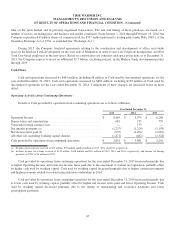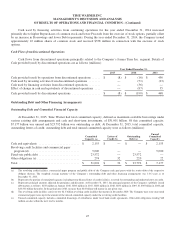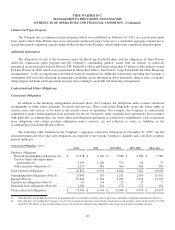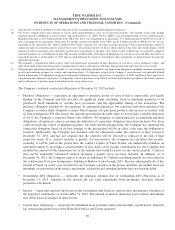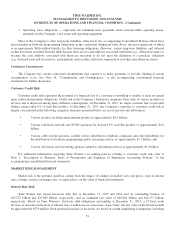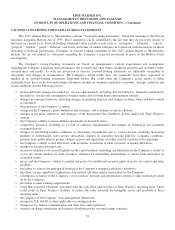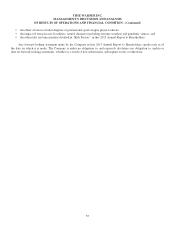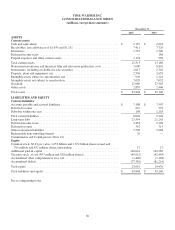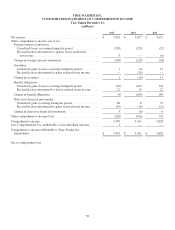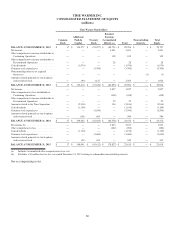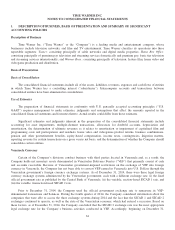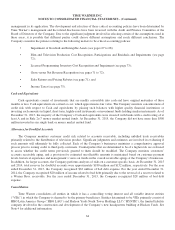Time Magazine 2015 Annual Report Download - page 68
Download and view the complete annual report
Please find page 68 of the 2015 Time Magazine annual report below. You can navigate through the pages in the report by either clicking on the pages listed below, or by using the keyword search tool below to find specific information within the annual report.TIME WARNER INC.
MANAGEMENT’S DISCUSSION AND ANALYSIS
OF RESULTS OF OPERATIONS AND FINANCIAL CONDITION - (Continued)
CAUTION CONCERNING FORWARD-LOOKING STATEMENTS
This 2015 Annual Report to Shareholders contains “forward-looking statements” within the meaning of the Private
Securities Litigation Reform Act of 1995. These statements can be identified by the fact that they do not relate strictly to
historical or current facts. Forward-looking statements often include words such as “anticipates,” “estimates,” “expects,”
“projects,” “intends,” “plans,” “believes” and words and terms of similar substance in connection with discussions of future
operating or financial performance. Examples of forward-looking statements in this 2015 Annual Report to Shareholders
include, but are not limited to, statements regarding the Company’s expected investment in space in the Hudson Yards
development.
The Company’s forward-looking statements are based on management’s current expectations and assumptions
regarding the Company’s business and performance, the economy and other future conditions and forecasts of future events,
circumstances and results. As with any projection or forecast, forward-looking statements are inherently susceptible to
uncertainty and changes in circumstances. The Company’s actual results may vary materially from those expressed or
implied in its forward-looking statements. Important factors that could cause the Company’s actual results to differ
materially from those in its forward-looking statements include government regulation, economic, strategic, political and
social conditions and the following factors:
• recent and future changes in technology, services and standards, including, but not limited to, alternative methods for
the delivery, storage and consumption of digital media and evolving home entertainment formats;
• changes in consumer behavior, including changes in spending behavior and changes in when, where and how content
is consumed;
• the popularity of the Company’s content;
• changes in the Company’s plans, initiatives and strategies, and consumer acceptance thereof;
• changes in the plans, initiatives and strategies of the third parties that distribute, license and/or sell Time Warner’s
content;
• the Company’s ability to renew affiliate agreements on favorable terms;
• competitive pressures, including as a result of audience fragmentation and changes in technology and consumer
viewing behavior;
• changes in advertising market conditions or advertising expenditures due to various factors, including decreasing
numbers of multichannel video service subscribers, changes in consumer viewing behavior, economic conditions,
pressure from public interest groups, changes in laws and regulations and other societal or political developments;
• the Company’s ability to deal effectively with economic slowdowns or other economic or market difficulties;
• changes in foreign exchange rates;
• increased volatility or decreased liquidity in the capital markets, including any limitation on the Company’s ability to
access the capital markets for debt securities, refinance its outstanding indebtedness or obtain bank financings on
acceptable terms;
• piracy and the Company’s ability to exploit and protect its intellectual property rights in and to its content and other
products;
• the failure to achieve the anticipated benefits of the Company’s enterprise efficiency initiatives;
• the effects of any significant acquisitions, dispositions and other similar transactions by the Company;
• a disruption or failure of the Company’s or its vendors’ network and information systems or other technology relied
on by the Company;
• the failure to meet earnings expectations;
• lower than expected valuations associated with the cash flows and revenues at Time Warner’s reporting units, which
could result in Time Warner’s inability to realize the value recorded for intangible assets and goodwill at those
reporting units;
• the adequacy of the Company’s risk management framework;
• changes in U.S. GAAP or other applicable accounting policies;
• changes in tax, federal communication and other laws and regulations;
• currency exchange restrictions and currency devaluation risks in some foreign countries;
54



